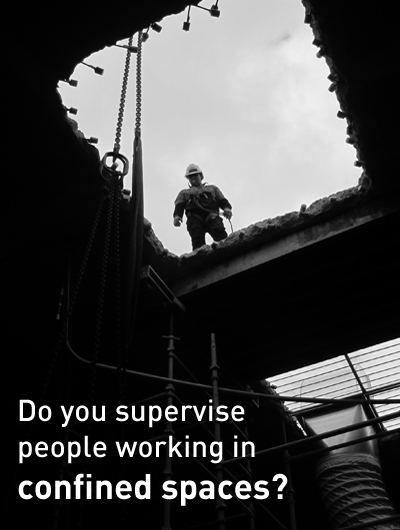No region selected
Confined Space Entry - 1 day
MSMPER205 - Enter confined space
MSMPER200 - Work in accordance with an issued permit
Face to Face
Allows workers to perform basic risk assessments and enter a confined space to conduct work under an issued permit. 100% face-to-face training.
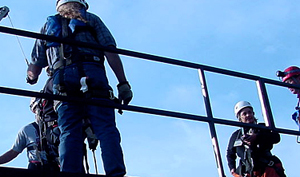
Course Dates
| Location (Regional VIC) | Start Date | Places Left |
|---|---|---|
|
For group bookings please call us on 1300 990 810. |
Course Details
Certification
Students who are deemed competent will receive a Statement of Attainment recognised under the Australian Qualifications Framework. This certification is nationally recognised. The Statement is issued by Pinnacle Safety and Training (RTO 40496).
National units of competency
- RIIWHS202E - Enter and work in confined spaces
- MSMPER205 - Enter confined space
- MSMPER200 - Work in accordance with an issued permit
Course Details
Course duration: 1 day (approximately 8 hours)
Up to 12 trainees per course
Price
- $289.00 pp for public courses. Book online and save $10.00! (scroll up, find your date, and click Book Now)
- Combine and save! Book Confined Space Entry and Working At Heights together and save $120! Call us to take advantage of this special offer.
- For group bookings outside our public course schedule or at your location, please submit your group booking enquiry here for an obligation free quote.
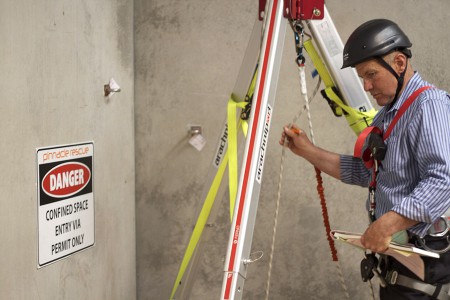
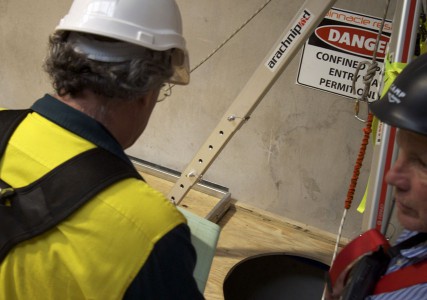
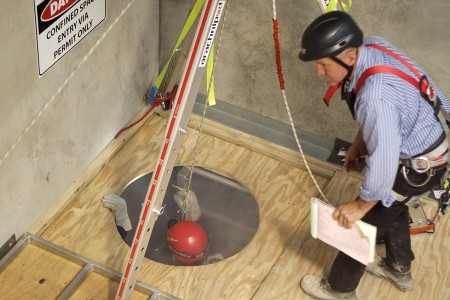
Course Overview
This is our basic course which gives you the skills to review a risk assessment, enter a confined space in accordance with an issued permit to conduct work, and conduct gas testing.
Note: For more advanced confined space training (including gas testing and issuing permits) or for training that covers planning and supervision of confined space operations, see our Confined Space 2 day course. This advanced training is required for anyone who may be required to control the works in the space via permit issuing, operating gas detectors or otherwise supervising confined space operations.
This nationally recognised training course is designed for people who work in or around confined spaces. The course can be tailored to suit the practical scenarios relevant to your company’s confined space operations. While there is a standard set of learning outcomes for the course, we understand that the context and environment in which the learning is applied is varied. It is designed to teach participants how to:
- Identify confined space hazards
- Work safely within confined spaces according to an issued permit
- Operate various confined space safety equipment
What is a Confined Space?
According to the Safe Work Australia Code of Practice, a “confined space” means an enclosed or partially enclosed space that:
- is not designed or intended primarily to be occupied by a person; and
- is, or is designed or intended to be, at normal atmospheric pressure while any person is in the space; and
- is or is likely to be a risk to health and safety from:
- an atmosphere that does not have a safe oxygen level, or
- contaminants, including airborne gases, vapours and dusts, that may cause injury from fire or explosion, or
- harmful concentrations of any airborne contaminants, or
- engulfment.
Examples of confined spaces include (but are not limited to):
- Storage tanks
- Tank cars
- Process vessels
- Pressure vessels
- Boilers
- Silos and other tank-like compartments
- Pits and degreasers
- Pipes
- Sewers
- Sewer pump stations including wet and dry wells, shafts and ducts
- Shipboard spaces entered through small hatchways or access points, cargo tanks, cellular double bottom tanks, duct keels, ballast or oil tanks and void spaces
This course is recommended for:
Course Outline
- Identifying confined spaces
- WHS legislation, codes of practice and Australian Standards
- Roles and responsibilities
- Identification of hazards
- Risk assessment
- Hierarchy of controls
- Work site policy and procedures
- Completing confined space permit applications
- Working according to a confined space permit
- Isolation procedures
- Atmospheric monitoring
- Fall protection equipment
- Safety and emergency procedures
- Entry and exit procedures
- Practical entry into a range of confined spaces
Currency
Australian Standard AS2865 recommends refreshing confined space training every 12-24 months.
Course Inclusions
- 8 hours of face-to-face training conducted by an experienced confined space specialist
- Hands-on practical training designed to develop safe work practices
- Knowledge of relevant legislation, codes of practice and Australian Standards relevant to confined spaces
- Recommendations and advice for specialised PPE and equipment for your workplace
- Advice on risk control methods for the type of work to be undertaken
Participant Requirements
Participants must
- Be at least 15 years of age
- Wear appropriate clothing, including long pants and closed in footwear
- Have at least a Year 10 level of numeracy, literacy and communication skills
- Have the ability to read and write English
For our public courses at our purpose built training facility trainees must provide:
- Transport
- Lunch
Equipment:
- We supply all equipment necessary for you to undertake this training, however we actively encourage you to bring along your own equipment.
I found Kerryn to be an excellent trainer and presenter who was able to share her industry experience well. The fact that she regularly provides Confined Spaces services to industry reflects well.
Les D. - Melbourne, VIC
Alcoa Fastening Systems & Rings
Raymond the trainer spoke very clearly (important) and was obviously very knowledgeable about confined space. He highlighted practical applications and really got the “personal safety” message across to the group. I have done these courses before, however I got more out of this due to the “SKILL” of the trainer to get the critical messages across.
The practical exercises were helpful in executing all the theory we had learnt during the morning session. Having three practical exercises is a good strategy as I was able to gain something from each one confined space entry (mistakes I made plus observing others under a little pressure).
A good one-day course which I would recommend.
Ross D - Brisbane, QLD
Anode EngineeringStudent Links
Good to see a company and instructor not just a tick and flick motto. I had done this course through another company a while ago and was nowhere near this standard.
